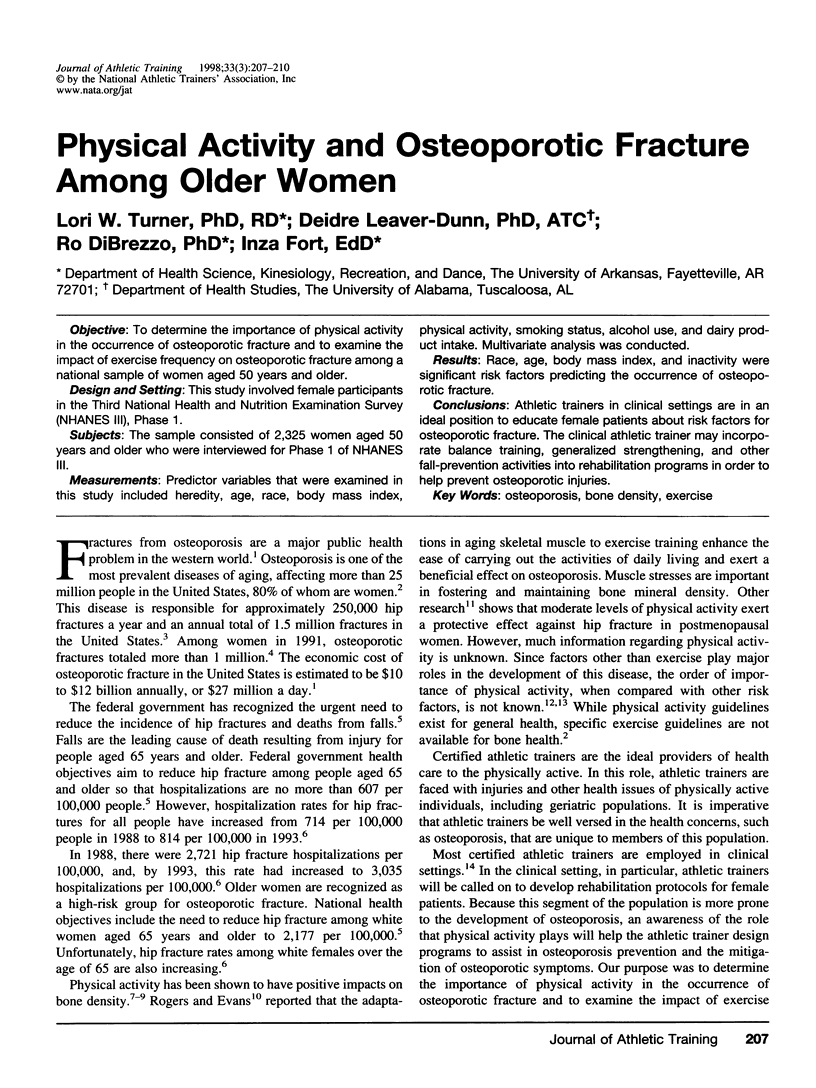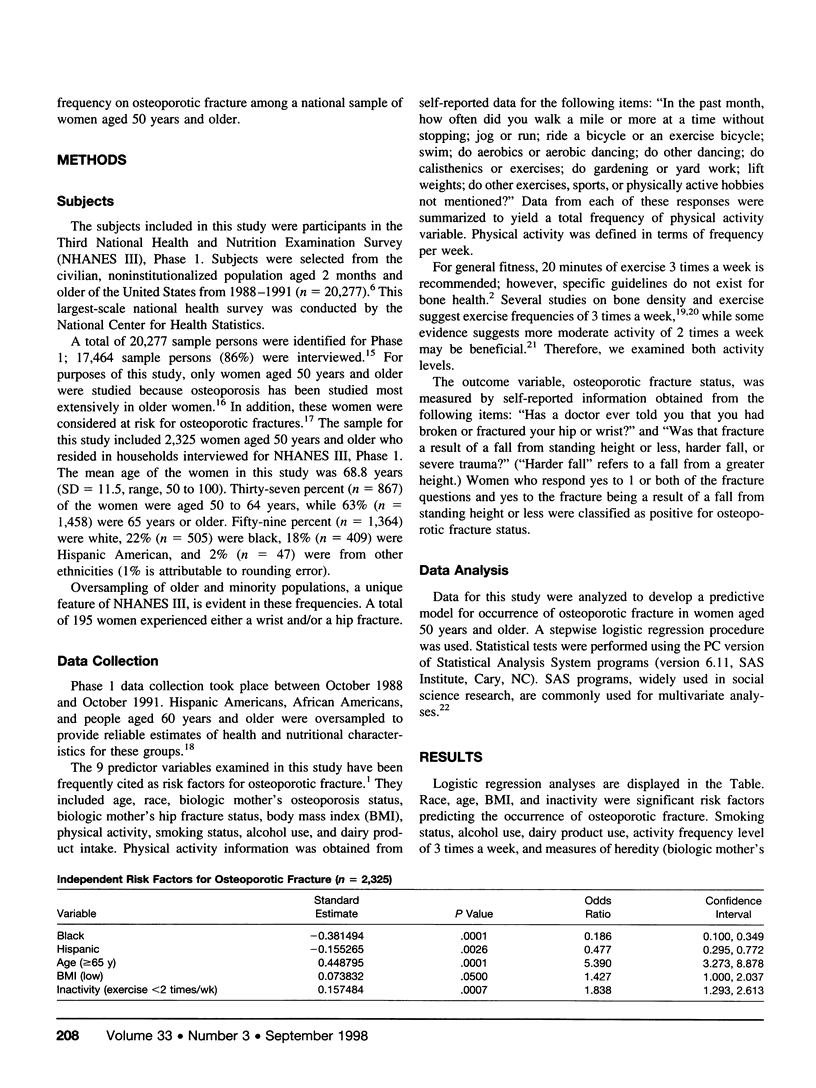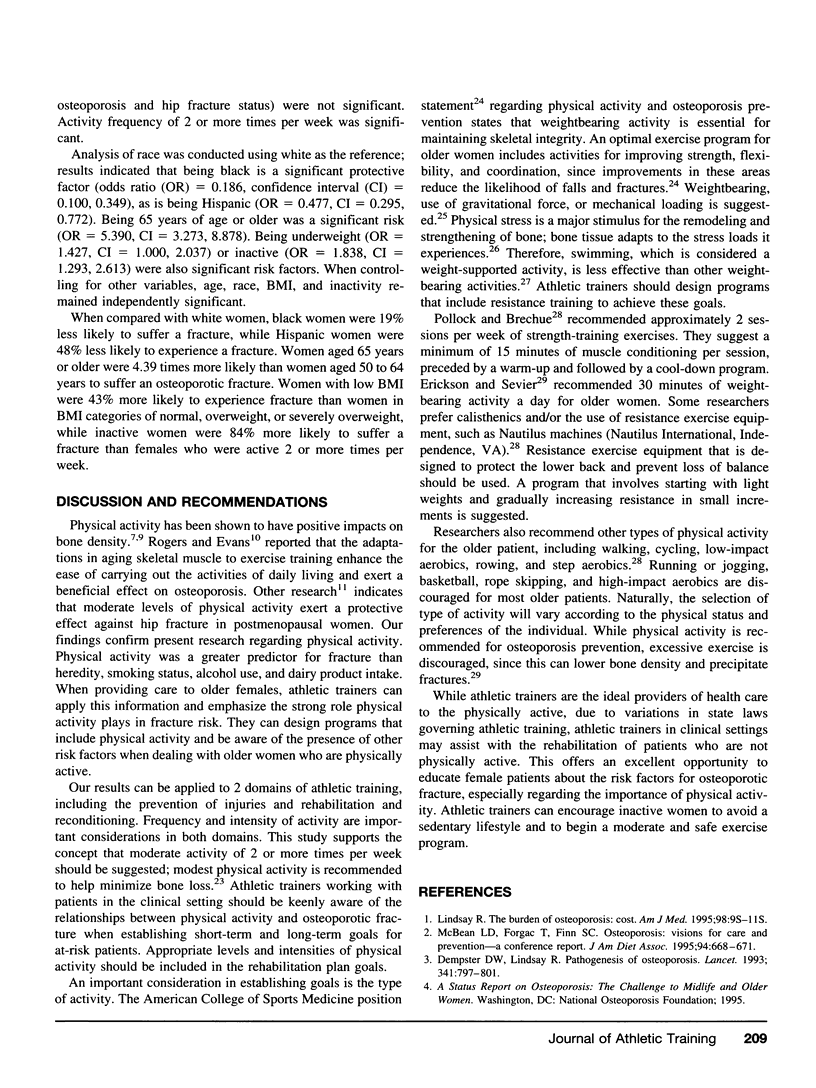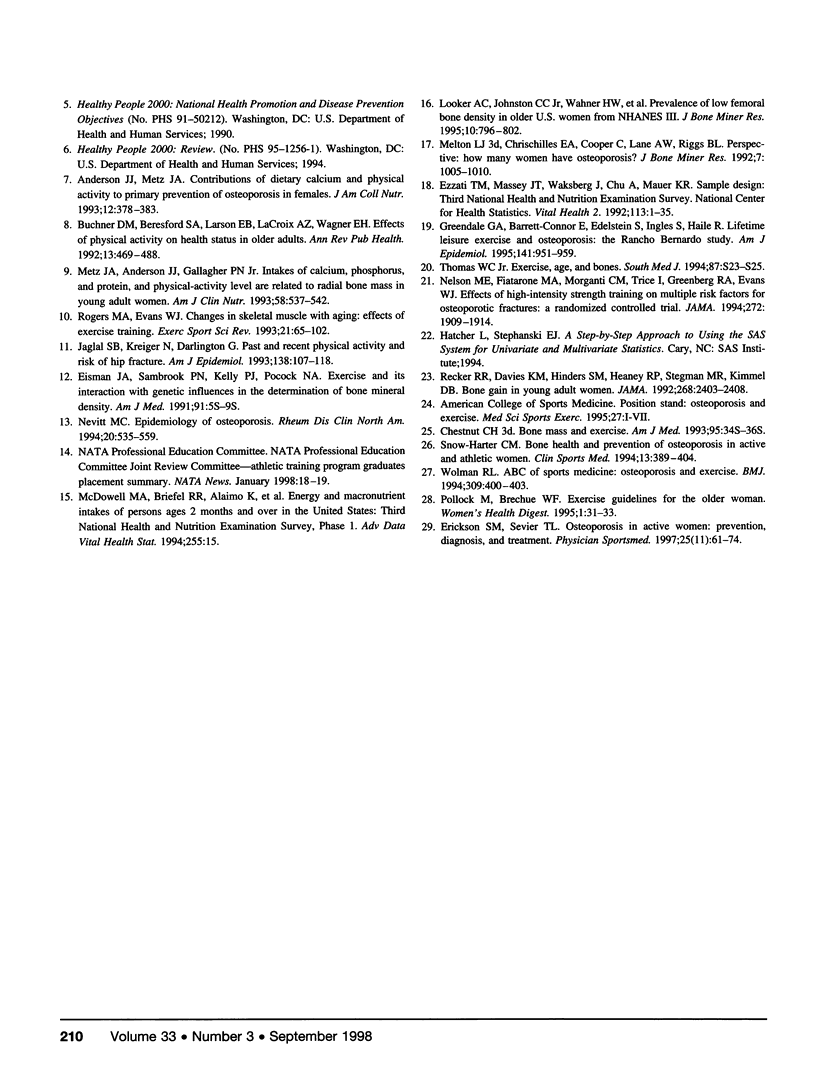Abstract
Objective:
To determine the importance of physical activity in the occurrence of osteoporotic fracture and to examine the impact of exercise frequency on osteoporotic fracture among a national sample of women aged 50 years and older.
Design and Setting:
This study involved female participants in the Third National Health and Nutrition Examination Survey (NHANES III), Phase 1.
Subjects:
The sample consisted of 2,325 women aged 50 years and older who were interviewed for Phase 1 of NHANES III.
Measurements:
Predictor variables that were examined in this study included heredity, age, race, body mass index, physical activity, smoking status, alcohol use, and dairy product intake. Multivariate analysis was conducted.
Results:
Race, age, body mass index, and inactivity were significant risk factors Predicting the occurrence of osteoporotic fracture.
Conclusions:
Athletic trainers in clinical settings are in an ideal position to educate female patients about risk factors for osteoporotic fracture. The clinical athletic trainer may incorporate balance training, generalized strengthening, and other fall-prevention activities into rehabilitation programs in order to help prevent osteoporotic injuries.
Keywords: osteoporosis, bone density, exercise
Full text
PDF



Selected References
These references are in PubMed. This may not be the complete list of references from this article.
- Anderson J. J., Metz J. A. Contributions of dietary calcium and physical activity to primary prevention of osteoporosis in females. J Am Coll Nutr. 1993 Aug;12(4):378–383. doi: 10.1080/07315724.1993.10718326. [DOI] [PubMed] [Google Scholar]
- Buchner D. M., Beresford S. A., Larson E. B., LaCroix A. Z., Wagner E. H. Effects of physical activity on health status in older adults. II. Intervention studies. Annu Rev Public Health. 1992;13:469–488. doi: 10.1146/annurev.pu.13.050192.002345. [DOI] [PubMed] [Google Scholar]
- Chesnut C. H., 3rd Bone mass and exercise. Am J Med. 1993 Nov 30;95(5A):34S–36S. doi: 10.1016/0002-9343(93)90379-4. [DOI] [PubMed] [Google Scholar]
- Dempster D. W., Lindsay R. Pathogenesis of osteoporosis. Lancet. 1993 Mar 27;341(8848):797–801. doi: 10.1016/0140-6736(93)90570-7. [DOI] [PubMed] [Google Scholar]
- Eisman J. A., Sambrook P. N., Kelly P. J., Pocock N. A. Exercise and its interaction with genetic influences in the determination of bone mineral density. Am J Med. 1991 Nov 25;91(5B):5S–9S. doi: 10.1016/0002-9343(91)90239-t. [DOI] [PubMed] [Google Scholar]
- Ezzati T. M., Massey J. T., Waksberg J., Chu A., Maurer K. R. Sample design: Third National Health and Nutrition Examination Survey. Vital Health Stat 2. 1992 Sep;(113):1–35. [PubMed] [Google Scholar]
- Greendale G. A., Barrett-Connor E., Edelstein S., Ingles S., Haile R. Lifetime leisure exercise and osteoporosis. The Rancho Bernardo study. Am J Epidemiol. 1995 May 15;141(10):951–959. doi: 10.1093/oxfordjournals.aje.a117362. [DOI] [PubMed] [Google Scholar]
- Jaglal S. B., Kreiger N., Darlington G. Past and recent physical activity and risk of hip fracture. Am J Epidemiol. 1993 Jul 15;138(2):107–118. doi: 10.1093/oxfordjournals.aje.a116833. [DOI] [PubMed] [Google Scholar]
- Looker A. C., Johnston C. C., Jr, Wahner H. W., Dunn W. L., Calvo M. S., Harris T. B., Heyse S. P., Lindsay R. L. Prevalence of low femoral bone density in older U.S. women from NHANES III. J Bone Miner Res. 1995 May;10(5):796–802. doi: 10.1002/jbmr.5650100517. [DOI] [PubMed] [Google Scholar]
- McBean L. D., Forgac T., Finn S. C. Osteoporosis: visions for care and prevention--a conference report. J Am Diet Assoc. 1994 Jun;94(6):668–671. doi: 10.1016/0002-8223(94)90172-4. [DOI] [PubMed] [Google Scholar]
- Melton L. J., 3rd, Chrischilles E. A., Cooper C., Lane A. W., Riggs B. L. Perspective. How many women have osteoporosis? J Bone Miner Res. 1992 Sep;7(9):1005–1010. doi: 10.1002/jbmr.5650070902. [DOI] [PubMed] [Google Scholar]
- Metz J. A., Anderson J. J., Gallagher P. N., Jr Intakes of calcium, phosphorus, and protein, and physical-activity level are related to radial bone mass in young adult women. Am J Clin Nutr. 1993 Oct;58(4):537–542. doi: 10.1093/ajcn/58.4.537. [DOI] [PubMed] [Google Scholar]
- Nelson M. E., Fiatarone M. A., Morganti C. M., Trice I., Greenberg R. A., Evans W. J. Effects of high-intensity strength training on multiple risk factors for osteoporotic fractures. A randomized controlled trial. JAMA. 1994 Dec 28;272(24):1909–1914. doi: 10.1001/jama.1994.03520240037038. [DOI] [PubMed] [Google Scholar]
- Nevitt M. C. Epidemiology of osteoporosis. Rheum Dis Clin North Am. 1994 Aug;20(3):535–559. [PubMed] [Google Scholar]
- Recker R. R., Davies K. M., Hinders S. M., Heaney R. P., Stegman M. R., Kimmel D. B. Bone gain in young adult women. JAMA. 1992 Nov 4;268(17):2403–2408. [PubMed] [Google Scholar]
- Rogers M. A., Evans W. J. Changes in skeletal muscle with aging: effects of exercise training. Exerc Sport Sci Rev. 1993;21:65–102. [PubMed] [Google Scholar]
- Snow-Harter C. M. Bone health and prevention of osteoporosis in active and athletic women. Clin Sports Med. 1994 Apr;13(2):389–404. [PubMed] [Google Scholar]
- Thomas W. C., Jr Exercise, age, and bones. South Med J. 1994 May;87(5):S23–S25. [PubMed] [Google Scholar]
- Wolman R. L. ABC of sports medicine. Osteoporosis and exercise. BMJ. 1994 Aug 6;309(6951):400–403. doi: 10.1136/bmj.309.6951.400. [DOI] [PMC free article] [PubMed] [Google Scholar]


